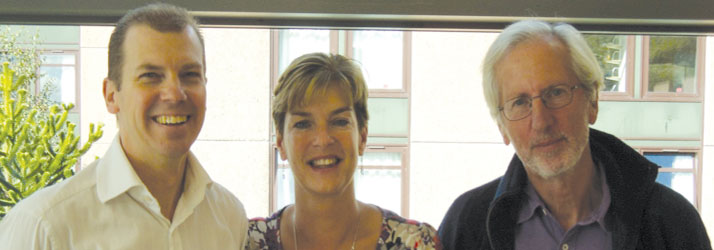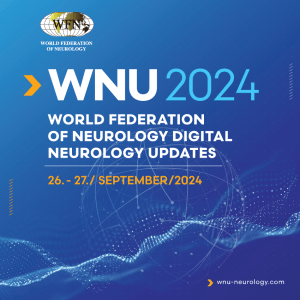
Seeing Beyond the Gene
Second National Conference on Huntington’s Disease
Background
2012 marked the 34th anniversary of the Advanced Clinical Neurology course in Edinburgh. Initially established by Professor Charles Warlow over three decades ago and now organised by Dr Richard Davenport, this highly successful course has carved a reputation for its relaxed, informal atmosphere and practical approach to neurology. The course gathered together over 60 participants, attracting medical students, trainees, consultants and neurology veterans. Lively discussion and interaction was encouraged, particularly from junior attendees. This year saw a change in venue to Edinburgh First, based at the university campus in the purpose built conference facilities. A variety of general topics were organised into six sessions, compacted into two days.
Day one
The course opened on Monday 10th September with a welcome address by Dr Richard Davenport followed by the first morning session entitled ‘Mostly Peripheral Nerves’. Dr Tim Williams (Newcastle) gave an excellent overview on motor neuron disease with an emphasis on the common mimickers of the condition and the potential for misdiagnosis. This was followed by Dr Arup Mallik’s (Glasgow) discussion of the common entrapment neuropathies including anterior/posterior interosseous neuropathies, carpal tunnel syndrome and ulnar neuropathy. A clear and concise guide to the localisation of lesions was presented with particular reference made to the importance of good clinical skills.
The second morning session concentrated on epilepsy with Professor John Duncan (London) delivering an informative talk on the importance of the classification of seizures. The discussion centred on focal seizures and included their recognition as well as localisation. Dr Hannah Cock (London) followed with a presentation on mortality in epilepsy. There was emphasis placed on SUDEP with a general overview including incidence, risk factors, suggested mechanisms and prevention. Dr Chris Derry (Edinburgh) gave the final talk of the session with a highly educational presentation on sleep and epilepsy. A series of patient videos were used to illustrate the differences between nocturnal frontal lobe seizures and various parasomnias. The audience had the opportunity to participate which made for enjoyable and effective learning. It was highlighted that a detailed and accurate history is key to the diagnosis as investigations are often normal.
Following the lunch break, Dr Huw Morris (Cardiff) opened the first afternoon session which covered movement disorders. An update on Progressive Supranuclear Palsy (PSP) was presented and detailed the diagnostic challenges of the condition. The limitations in the current diagnostic criteria were highlighted. Features that distinguished PSP from Parkinson’s disease (PD) were discussed including the pattern of bradykinesia, distinctive gait and posture as well as saccadic eye movements. The genetic predisposition to the condition was also covered. Dr Carl Counsell (Aberdeen) delivered a talk entitled ‘Ten things I wish I had known about PD when I started’. Primarily directed at trainees, this was a fantastic presentation of the difficulties posed by PD, particularly with regard to early diagnosis and subsequent management. We learnt not to be afraid of reviewing patients over time and to monitor their symptoms before committing to the diagnosis as it may not be obvious at initial presentation. The role of FP-CIT scans was discussed although it was emphasised that they are not a substitute for clinical skill or experience.
Day 2
The final session of the day commenced with an invited lecture from Dr Alastair Compston (Cambridge) who gave a fascinating talk on the history of BRAIN. The clinicopathological conference concluded the day with a complex case expertly discussed by Dr Hadi Manji (London). The diagnosis of paraneoplastic limbic encephalitis associated with a neuroendocrine tumour eluded all participants. This was followed by an evening of dinner and drinks.
Day two was opened by Dr Edward Fathers (Taunton) who turned the direction of discussion to presentations in general and how to give a good talk. Tips were given on style, content and how to captivate the audience as well as common pitfalls and habits to be avoided. The founder of the course, Professor Charles Warlow (Edinburgh), followed with invaluable advice on how to write a good paper. Emphasis was placed on the importance of writing clearly, concisely and consistently with examples provided to highlight a variety of ‘do’s and don’ts’.
The final session covered a medley of topics beginning with Dr Miles Connor (Fife) presenting the challenges facing sub-Saharan Africa in delivering a neurology service. We learnt about the burden of neurological disease and the difficulties in accessing neurologists, particularly in rural areas. The limitations in diagnostic tools and the reliance on excellent clinical skills were highlighted. Initiatives to improve neurological services were also covered. Dr Peter Enevoldson (Liverpool) gave a highly educational talk on ‘top-tips in neuro-opthalmology’. Red flag symptoms that suggest an underlying neurological problem and key points to aid localisation of lesions were discussed. Transient monocular blindness and its potential causes were discussed with amaurosis fugax considered in detail. Dr Alok Tyagi (Glasgow) delivered an excellent overview on spontaneous intracranial hypotension. Causes, associations and complications were covered with a helpful algorithm on diagnosis and management.
Professor Tom Warner (London) gave an illustrative teaching session on dystonia with an overview of primary and secondary cases. The course concluded with talks focused on muscle. Dr Cheryl Longman (Glasgow) concentrated on the genetic aspects of muscle disease followed by an informative overview of acute and chronic myopathies by Dr James Miller (Newcastle).
Concluding remarks
This is an organised, high quality course with an excellent standard of presentations addressing a number of neurological topics. It offers a fantastic opportunity to keep updated with general knowledge and advances in neurology. The relaxed and enthusiastic approach to learning along with plenty of opportunity for discussion and interaction make this course highly enjoyable and not to be missed.

